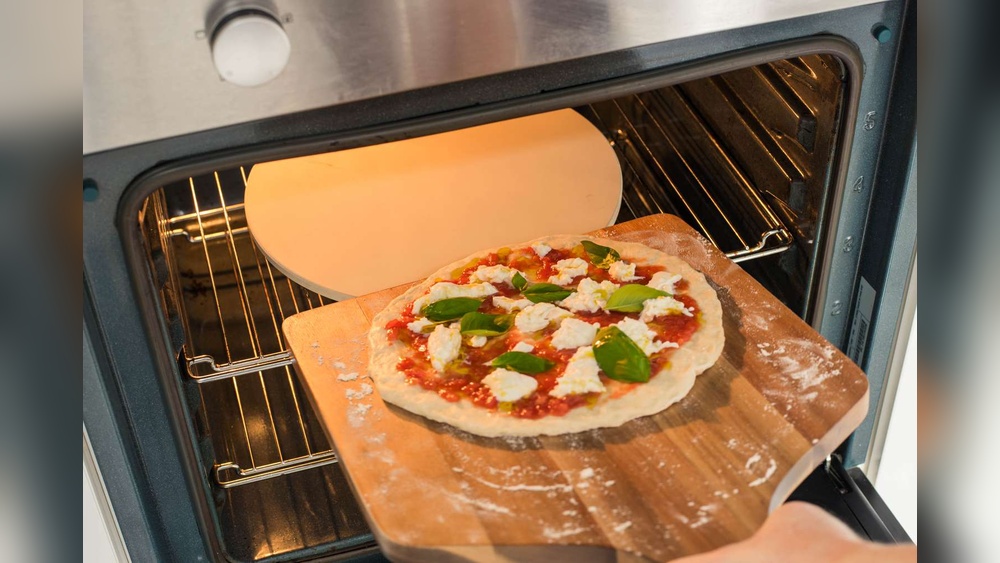If you love making pizza at home, you’ve probably wondered about your pizza stone. Do you need to season it before using it?
This question might seem small, but the answer can make a big difference in how your pizza turns out. Seasoning your pizza stone properly can help prevent sticking, improve heat distribution, and even extend the life of your stone. You’ll discover exactly what seasoning means, why it matters, and how to do it right.
Keep reading to make sure your pizza stone works perfectly every time you bake.

Credit: sprinklesomefun.com
Why Season A Pizza Stone
A pizza stone is a great tool for baking crisp and tasty pizzas at home. Some people wonder if they must season their pizza stone before use. Seasoning means treating the stone to improve its cooking performance and durability. This process can protect the stone and help it work better in your oven.
Benefits Of Seasoning
Seasoning a pizza stone helps prevent food from sticking. It creates a natural non-stick surface over time. This makes removing pizza easier and keeps the toppings intact.
The process also helps protect the stone from cracking. Oils or fats used in seasoning fill tiny pores in the stone. This reduces water absorption and increases the stone’s life span.
Seasoned stones heat more evenly. They keep consistent temperature, giving your pizza a perfect crust. The stone also absorbs less moisture, which helps in crisping the dough.
Common Misconceptions
Many believe pizza stones need heavy oiling or special coatings. This is not true. Using too much oil can cause smoke and bad odors during baking.
Others think seasoning is mandatory before first use. Some stones come pre-seasoned or need only a simple rinse. Always check the manufacturer’s instructions for best care tips.
Some assume seasoning is similar to seasoning cast iron pans. Pizza stones and cast iron have different materials and care needs. Treat your stone gently to avoid damage.
Types Of Pizza Stones
Pizza stones come in different types, each with unique features. Choosing the right one affects your pizza’s taste and cooking time. Some stones need seasoning, while others do not. Understanding the types helps you decide if seasoning is necessary.
Ceramic Stones
Ceramic stones are popular for their even heat distribution. They absorb moisture well, which makes the crust crispy. These stones often require seasoning before first use. Seasoning helps to prevent sticking and extends the stone’s life.
Cordierite Stones
Cordierite stones are durable and resist cracking under high heat. They heat quickly and maintain temperature for longer. These stones usually do not need seasoning. A simple cleaning after use is enough to keep them ready.
Steel Alternatives
Steel alternatives heat faster than stones and last longer. They give a crispy base but do not absorb moisture. Seasoning steel is important to stop rust and improve non-stick properties. Regular oiling keeps the surface in good shape.
When To Season Your Stone
Knowing when to season your pizza stone helps keep it in good shape. Seasoning builds a natural non-stick surface. It also protects the stone from moisture and cracking. Not every stone needs seasoning all the time. Timing matters to get the best results.
New Stones
New pizza stones often benefit from seasoning before first use. This step seals tiny pores in the stone. It stops moisture from getting inside. Lightly oil the stone with a high-smoke point oil. Then heat it slowly in the oven. This process creates a protective layer. It also helps food slide off easily during cooking.
After Deep Cleaning
Deep cleaning strips away built-up oils and food bits. It can remove the natural seasoning layer on your stone. After this, re-season the stone to restore protection. Apply a thin layer of oil and bake it again. This helps the stone stay durable and non-stick. Regular light cleaning does not require re-seasoning.

Credit: www.napoleon.com
How To Season A Pizza Stone
Seasoning a pizza stone helps improve its performance and lifespan. It creates a protective layer that prevents sticking and damage. The process is simple and only takes a short time. Follow these steps to season your pizza stone properly.
Cleaning Before Seasoning
Start by rinsing the stone with warm water. Avoid soap or detergent. Use a soft brush or cloth to remove any dirt. Let the stone dry completely before moving on.
Applying Oil
Choose a light oil with a high smoke point, like vegetable or canola oil. Use a clean cloth or paper towel to spread a thin, even layer on the stone. Cover the entire surface, but don’t soak it. Wipe off any excess oil.
Baking Process
Place the stone in a cold oven on the middle rack. Set the oven to 375°F (190°C). Bake for about one hour to let the oil soak in. Turn off the oven and let the stone cool inside. This seals the stone and creates a non-stick surface.
Tips For Maintaining Your Pizza Stone
Keeping your pizza stone in good shape helps it last longer and work better. Proper care improves baking results and prevents damage. Follow these tips for simple maintenance.
Cleaning After Use
Let the stone cool before cleaning. Avoid using soap or detergent. Use a brush or scraper to remove stuck food. Wipe with a damp cloth if needed. Never soak the stone in water. This keeps it dry and prevents cracking.
Avoiding Cracks
Heat the stone slowly to avoid thermal shock. Place it in a cold oven before turning it on. Do not put cold stone in a hot oven. Avoid dropping or banging the stone. Use a sturdy surface to hold it. Small cracks can grow, so handle carefully.
Storage Advice
Store the stone in a dry place. Keep it away from heavy items that could break it. Place it flat or upright to avoid pressure points. Let it air out if damp before storing. Proper storage keeps the stone ready for your next pizza night.
Signs Your Pizza Stone Needs Reseasoning
Recognizing when your pizza stone needs reseasoning is important. A well-seasoned stone improves cooking and lasts longer. Some signs show that the stone’s seasoning is wearing off. Spotting these signs early helps keep your pizza stone in top shape.
Surface Changes
The stone may develop white or chalky spots. These spots mean the seasoning layer is fading. The surface might also look dry or rough. A properly seasoned stone has a smooth, slightly shiny look. Cracks or flaking can appear if the stone is too dry. These changes reduce the stone’s non-stick quality.
Performance Issues
The stone might take longer to heat up than before. Pizza crusts can stick more often during baking. The stone may not produce the same crispy texture. Heat may not distribute evenly across the surface. These problems show the seasoning is worn out. Reseasoning restores heat retention and non-stick properties.

Credit: www.11inchpizza.com.au
Frequently Asked Questions
Do You Need To Season A Pizza Stone Before Use?
No, most pizza stones do not require seasoning. Just rinse with water and dry thoroughly before first use to remove dust.
How Does Seasoning A Pizza Stone Affect Cooking?
Seasoning can create a natural non-stick surface. It helps prevent dough from sticking and can improve heat distribution.
Can Seasoning Damage My Pizza Stone?
Yes, improper seasoning with oils can cause smoking or odors. Use only recommended oils and avoid excessive coating.
How Often Should You Season A Pizza Stone?
Seasoning is typically a one-time process before first use. Re-season only if the stone surface becomes sticky or dull.
Conclusion
Seasoning a pizza stone is not always required. Many stones work well straight from the box. But seasoning can help prevent sticking and cracks. It creates a natural non-stick layer on the stone. Use a little oil and bake it slowly to season.
Clean the stone gently without soap afterward. Taking care of your stone keeps it lasting longer. Enjoy baking crispy, delicious pizzas every time. Simple steps make a big difference in your pizza game. Try seasoning once and see how it feels.
Your pizza stone will thank you.

